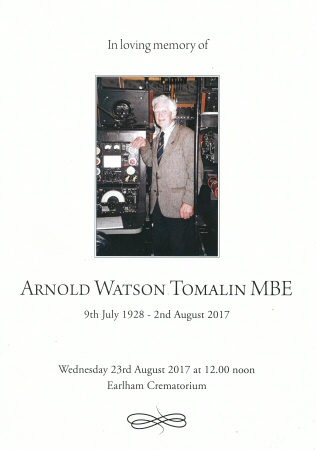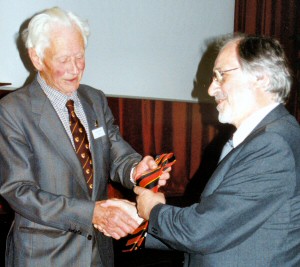In loving memory ofArnold Watson Tomalin MBE9th July 1928 - 2nd August 2017
|
 |
Welcome
Hymn: The Lord's My Shepherd; Tune Crimond
At home he was a keen gardener and do-it-yourselfer for both his parents and his family and could turn his hand to both wood and metal.
Scripture Reading: Revelation, Chapter 21: verses 1-4
The Commendation The Committal The Blessing
Exit Music: Jesu, Joy Of Manís Desiring
The cards and messages of sympathy have been of great comfort and are greatly appreciated.
All are invited to join them at Park Farm Hotel, Hethersett NR9 3DL for refreshments, following the service.
Donations in memory of Arnold are for St Botolph's Parish Church, Barford.
RJ Bartram & Son Funeral Service 42 Fairland Street, Wymondham, NR18 OJS.
The Shape of Things to Come AW Tomalin (1939-1946), from the last Soham Grammarian, 1972 "One
September day in 1945 the deputy head boy was summoned to
the headmaster's study (new headmaster, new deputy head
boy!). There sat E.A. and on the desk in front of him a
set of sparking plugs, knife in the pen tray, carbon in
the out tray. No-one needs reminding that the new H.M. had
written a book on Practical Physics.
He
is on the 1946
School Photo. Valete 1946: AW Tomalin. Prefect. Vice-Captain of the School. School Certificate 1944. Higher School Certificate 1946. Games Committee. Vice-Captain 1st XV Rugby. School Athletics Team. At the 1947 Speech Day Arnold was awarded:- A Higher School Certificate Prize - The Biology Prize - Headmaster's Merit Prize (shared with RF Watts). |
 Arnold (L) presenting an SG tie to honorary SG Mike Rouse |
Soham Grammarian Autumn 1946
AW Tomalin, who was last year's Vice-Captain of the School, left us at the beginning of term. He has contributed this article on his life as an RAF recruit.
I AM AN A.C. 2
To-day I saw in the papers that one and a half million men are still left in the forces. We all know that the services are short-handed by this estimate, but, from my own experiences, I would say that the R.A.F. is overcrowded. This impression is gained while one is at a Recruit Centre, or more especially, a Reception Centre. It is the large number of men passing through a reception centre, such as Padgate, which leads to the idea that the R.A.F. is crowded.
The never-ending queueing that dominates one's first fourteen days in the R.A.F. is something that civilians simply do not experience. To the recruit of the last six months, the mention of "Number One Waiting Room" is enough to invite an outburst in which the words "Twelve hours for Pay Book" may often figure. My own experiences were not so, but I can vouch that it is far from impossible to wait one and a half hours for tea.
From the time of arrival at a Reception Centre, one is anticipating the time when one will be posted to a Recruit Centre for "Square-Bashing." The chances of being posted nearer home form the main topic of conversation until one's fate is known. A large-scale map of Britain is an almost priceless asset.
The importance of regular mail from home has been greatly publicised during the war. The true importance is only realised when one becomes an 'A.C. 2'. We get two mail deliveries a day, mid-day and evening. The first remark anyone makes on entering the billet at these times is "Mail in Yet ?" With thirty men in a billet, there is an almost suicidal rush when the unfortunate "Postman" arrives. To deal with mail in the reverse direction, it is on Sunday afternoons that most letter-writing is done. The usual cry at this time is "Who'll sell some stamps?" the nearest post office being a mile away. As a thousand men use the same N.A.A.F.I., it is almost impossible to get anything there without an hour's wait.
I will give the following facts about life here as opposed to that given by recruiting posters. Breakfast is at a quarter past six in the morning. One has therefore to get up at about twenty minutes to six in order to dress and have a very rough wash. After breakfast (about seven o'clock) there is a stack of cleaning to do before parade and inspection at eight o'clock. The usual brass, a bayonet, and rifle, have all to be dealt with, and then there are still two pairs of boots.
Work starts at a half past eight and continues, with various breaks, until a quarter to twelve, when we parade for dinner. After this we get an hour's break in which to read our mail and clean our boots again. The afternoon session lasts from a half past one until a quarter to five. Tea follows, and we are officially off-duty for the day. I say 'officially' because there are washing, writing, and still more cleaning to be done. This, and the search for food in the N.A.A.F.I., occupy the evening until half past nine, when we must be back in the billet.
Finally, a word on the actual training programme. The popular title "SquareBashing" is rather misleading because there are many lectures in the course, which occupies eight weeks in all. We get drill and lectures mixed up, which makes it less monotonous. Aircraft recognition, weapon training, P.T. and games form a very large part of the course. The grand climax comes with the "Pass Out" parade, when the whole flight goes through all the drill movements on the Parade Ground under the direction of the Squadron Commander.
To us, though, an even greater day will be the one on which we hand back our rifles. No more 'Square Bashing' after that! As I have not reached that stage, I think I must wait before adding more to this account. (Further instalments will be welcomed - Ed.)
AW TOMALIN
Soham Grammarian Autumn 1947
AW Tomalin is now serving with the RAF in Iraq. He is stationed 60 miles from "Old Baghdad" at a camp that was partly demolished at the beginning of the war by a local chieftain with artillery. His journey there was quite eventful, he informs us, as "the wireless equipment decided to strike" during one stage, and on another occasion the aircraft was forced down to a small and lonely staging post in the desert. With a whole year to pass before his demobilisation life in Persia appears to be suiting him tolerably well, except for the fact that the high temperatures both in summer and winter remove all possibilities of his skating and playing rugby.
Soham Grammarian Summer 1949
AW Tomalin is Assistant Experimental Officer in a Cambridge Research Department.
FlyPast magazine Readers have sent in illustrations of Iraqi Hawker Furies 55 years apart. From Arnold W Tomalin comes a view of a Fury ISS on delivery through RAF Habbaniya in Iraq in 1948. Arnold was a wireless mechanic on the Flying Wing at the time and remembers several Furies spending a day or so at the airfield making use of the air-to-ground firing range - which he describes as "a heap of oil drums way out in the desert". With its bomb racks seemingly obscuring the last Arabic number of its serial and with the date being 1948, this is very likely either 240 or 241, which were delivered in May that year. Of these two the former is known to have been exported to the USA in 1979 becoming N645F, although its current status is unknown.
ARNOLD W TOMALIN
He was an enthusiastic radio ham G3PTB. In the CAMBEAM April 1965 newsletter he wrote: "As most of you are aware I have recently moved from Histon to Norwich, being given about six months notice of the move. Naturally much of this time was taken up by the search for the new house and consideration was obviously given to amateur radio activities without being unreasonably biased by these factors. One estate agent recognised my RSGB badge and promptly produced only details of properties above the 400 ft. contour with appropriately high prices. No consideration was given to properties with snail gardens - both from the aerial point of view and also the horticultural, as "no space" aerials, while common in the literature, seem rather less common in actual use. Fortunately a suitable QTH and price was found easily and quickly." He joined the Norfolk Amateur Radio Club.
He was awarded the MBE in the 1989 New Year Honours :
Arnold Watson Tomalin, lately Senior Information Officer, Agricultural and Food Research Council.
If you can add to this page please contact the editor
last update 3 Oct 2017: 27 Oct 2017
